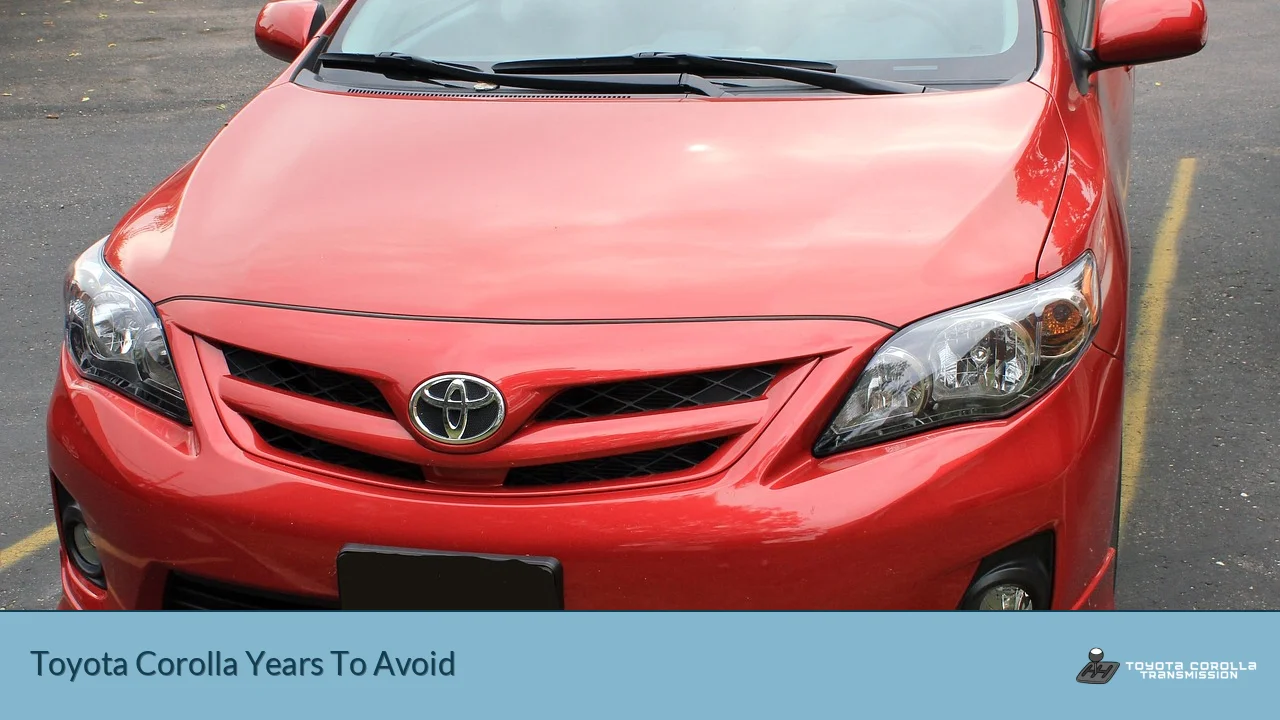When considering the purchase of a used Toyota Corolla, it is crucial to be aware of specific model years that have garnered a reputation for reliability issues. Despite the Corolla’s overall status as a dependable vehicle, certain years have been associated with significant problems that can lead to costly repairs and frustrating ownership experiences. This article will outline the Toyota Corolla years to avoid, providing insights into the common issues reported by owners and the reasons behind their negative reputation.
| Model Year | Common Issues |
|---|---|
| 2002 | Excessive oil consumption, safety concerns |
| 2003 | Transmission failure, airbag issues |
| 2009 | Oil consumption, steering problems |
| 2010 | Steering issues, braking problems |
| 2014 | Transmission problems, electrical issues |
Model Year 2002: A Year to Skip
The 2002 Toyota Corolla is often cited as one of the worst years for this model. Owners frequently report excessive oil consumption, which can lead to increased maintenance costs and engine wear over time. This issue tends to manifest even in vehicles with relatively low mileage, making it a significant concern for potential buyers.
In addition to oil consumption problems, the 2002 model has been criticized for its safety ratings. It received disappointing scores from both the National Highway Traffic Safety Administration (NHTSA) and the Insurance Institute for Highway Safety (IIHS), raising alarms about its crashworthiness. With both mechanical and safety concerns, this model year is best avoided by those seeking a reliable vehicle.
Model Year 2003: Transmission Troubles
The 2003 Toyota Corolla continues the trend of problematic models. This year is particularly notorious for transmission failures. Many owners have reported issues such as grinding noises and eventual transmission failure, often requiring costly repairs or replacements that can exceed $1,200.
Moreover, the 2003 model faced serious airbag concerns, with multiple recalls issued due to potential airbag deployment failures. The combination of transmission and safety issues makes this model year a risky choice for buyers looking for a dependable used car.
Model Year 2009: Engine and Steering Issues
The 2009 Toyota Corolla is another model year that should raise red flags for potential buyers. One of the most common complaints involves excessive oil consumption, similar to what was seen in earlier models. This problem not only affects engine performance but can also lead to significant repair costs if left unaddressed.
Additionally, many drivers have reported issues with the electronic power steering system, which can fail unexpectedly or feel unstable while driving. Such steering problems not only compromise vehicle handling but also pose safety risks on the road. Given these concerns, it’s advisable to steer clear of the 2009 Corolla.
Model Year 2010: Ongoing Concerns
Similar to its predecessor, the 2010 Toyota Corolla carries forward many of the same issues that plagued the 2009 model. Owners have reported persistent problems with steering stability and electronic power steering failures. These issues can lead to an uncomfortable driving experience and may require expensive repairs.
Furthermore, reports of braking system malfunctions have also surfaced for this model year. Such reliability concerns diminish the appeal of the 2010 Corolla, making it less desirable compared to other options in the used car market.
Model Year 2014: A New Generation with Old Problems
The 2014 Toyota Corolla marked a new generation but unfortunately came with its own set of reliability challenges. Many owners have experienced significant transmission problems, particularly with the continuously variable transmission (CVT). Complaints include jerky shifting and unusual noises during operation, which can affect overall vehicle performance.
In addition to transmission troubles, this model year has been associated with various electrical issues, including problems with interior components such as infotainment systems and dashboard rattling noises. These factors contribute to a less favorable ownership experience, prompting potential buyers to consider other model years instead.
Conclusion
While the Toyota Corolla is generally known for its reliability and efficiency, certain model years are best avoided due to common mechanical and safety issues. The years 2002, 2003, 2009, 2010, and 2014 stand out as problematic choices that may lead to frustration and unexpected expenses for owners.
When searching for a used Toyota Corolla, it is wise to focus on models outside these years or seek out more reliable alternatives within the Corolla lineup. By doing so, you can enhance your chances of enjoying a dependable driving experience without facing frequent repairs or safety concerns.
FAQs About Toyota Corolla Years To Avoid
- Which Toyota Corolla years should I avoid buying as used?
Avoid Toyota Corolla models from 2002, 2003, 2009, 2010, and 2014 due to high complaint rates regarding reliability. - What are the main problems reported with the Toyota Corolla models from 2000 to 2009?
The main issues include excessive oil consumption in models like 2002 and 2009 and transmission failures in models like 2003. - Is there a Toyota Corolla year known for having the most problems?
The 2009 Toyota Corolla is particularly notorious for excessive oil consumption and steering problems. - What common problems should potential Toyota Corolla owners be aware of?
Potential owners should be aware of excessive oil consumption, faulty transmissions, electrical issues, and airbag malfunctions. - Are all Toyota Corollas reliable?
While many Corollas are reliable, specific years like those mentioned above have significant reliability concerns that buyers should consider.

